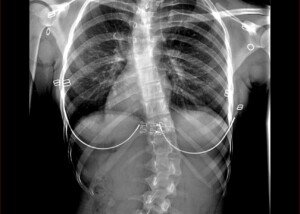Cymbalta may help blunt the pain of spinal stenosis – but not in the way most people would think.
Cymbalta may provide some relief, but doesn’t help fix the underlying problem of spinal stenosis.
“Stenosis” means narrowing, so in this case, it’s the narrowing of the canal through which the spinal cord runs.
“If the patient is symptomatic with spinal stenosis — (e.g., low back pain radiating to the lower extremities accompanied by numbness, tingling and weakness, exacerbated by standing, and relieved to some degree by sitting and leaning forward) — a drug like Cymbalta works by blocking the perception of pain by the brain,” explains John D. Lipani, MD, FACS, neurosurgeon-in-chief for and founding director of Princeton Neurological Surgery in NJ.
“However, stenosis is a physical phenomenon in which nerves are compressed by a herniated disc, arthritic bony/ligamentous overgrowth, tumor or an unnatural curve of the spine,” says Dr. Lipani.
When you see an older person walking with an obvious forward lean, chances are that he or she has spinal stenosis.
The forward lean while walking helps prevent the pain that would result if they walked (or stood) straight.
This is not a postural problem. The issue cannot be instantly corrected with a command to “stand straight!”
If the patient forces this, there’ll be pain – too much to maintain an erect posture.
Cymbalta’s effect on the brain, not the spine, is what reduces the pain.

Spinal stenosis
For some patients, this drug may work wonders – enough so that they can walk around town without suffering.
But whatever’s going on in their spinal column will not be changed by taking Cymbalta or any other drug.
“Sometimes the nervous system will adjust to the compression, and symptoms will resolve in time,” says Dr. Lipani.
“Other times symptoms will resolve with anti-inflammatory medication such as NSAIDs or steroids.”
But even then, over time, the issue with the spinal column may continue progressing, such that over-the-counter drugs eventually do little for pain relief.
Eventually, stronger prescription drugs may be minimally effective.
Dr. Lipani says that “persistent, unrelenting spinal stenosis symptoms may eventually require surgical decompression.”
 Dr. Lipani is a board certified, fellowship-trained neurosurgeon. His specialties include minimally invasive spine surgery and non-invasive brain and spine radiosurgery. He’s the founding director of the JD Lipani Radiosurgery Institute™ for non-invasive neurosurgery.
Dr. Lipani is a board certified, fellowship-trained neurosurgeon. His specialties include minimally invasive spine surgery and non-invasive brain and spine radiosurgery. He’s the founding director of the JD Lipani Radiosurgery Institute™ for non-invasive neurosurgery.
 Lorra Garrick has been covering medical, fitness and cybersecurity topics for many years, having written thousands of articles for print magazines and websites, including as a ghostwriter. She’s also a former ACE-certified personal trainer.
Lorra Garrick has been covering medical, fitness and cybersecurity topics for many years, having written thousands of articles for print magazines and websites, including as a ghostwriter. She’s also a former ACE-certified personal trainer.
.



























